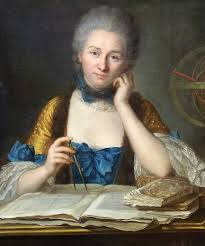Actually, I think it’s more than a mere acquaintance. I like to think of it much more as a friendship.
It’s a one-sided friendship, I grant you that. Well, it could hardly be any other way. Because Emily, as I like to think of her though she’d be more properly referred to as Emilie, does not include among her stellar qualities – brilliance, drive, generosity – the rather practical one of being alive. In fact, she died well over 250 years ago.
 |
| Emily at work |
Emily may be one of my friends, but I would not have been one of hers.
None of that stopped me working on a novel based on her life. It takes the form of a confession, from her death bed, in which she reflects on all she has done or failed to do, the things that might have gone better, the things that could have been or actually were disasters. I was fascinated by the subject and got the whole thing written bar perhaps twenty pages some three or four years ago.
Other things then got in the way. Work was one, but that has finished. A different novel also held me up: this is the one where I make space available for Misty, our cat, along with Luci, our first toy poodle, and Toffee, the second and the most turbulent of the three, to express their views. These I have stolen from their diaries, and I’m proud of all three for their achievement: after all, most peoples’ pets can barely hold a pen let alone keep a diary.
The first book of their diary extracts (wittily entitled Through a cat’s eyes and dogs’ tales) is now complete and is only looking for a publisher (I say ‘only’ but that’s a far bigger undertaking, it seems to me, than writing the dratted thing in the first place).
 |
| All three animals with Danielle One of the illustrations by my daughter-in-law Senada |
So now I’ve been able to get back to Emily.
One of the pleasurable aspects of the book is that I’ve used her voice wherever possible. We have a lot of her correspondence, so I know what she actually said about certain events and people (not necessarily what she thought about them: as the politics of today’s world show, what people say isn’t always what they think).
She also wrote a lot, though she didn’t always publish it. For instance, she kept her Discourse on Happiness strictly to herself in her life, though we’ve published it since.
The best way of making sure of happiness, she argued, was to make it depend entirely on yourself. Study, she says, is the best way to achieve that aim. And yet:
…the passion which can give us our greatest pleasure and make us happiest, leaves our happiness entirely dependent on others: you understand that I am talking about love. This passion is perhaps the only one that can make us desire life, and make us grateful to the creator of nature, whoever he might be, for giving us our existence.
Emily had such a passion. The one great love of her life, among many other lesser ones, was for the most celebrated wit and polemicist of their time, Voltaire. But:
I don’t know however whether love has ever brought together two people made for each other to such a point that they would never feel the surfeit of pleasure, or the cooling to which ease and security lead, nor the indolence and half-heartedness which arise from familiarity and the long continuance of a relationship
That was the fate of her bond with Voltaire. Towards the end of her life, they were both indulging in affairs with others. Indeed, she fell pregnant at 42, a dangerous age at that time, as a result of an infatuation for a much younger and entirely inappropriate man. She died as result of an infection associated with childbirth.
Hence the death bed with which my novel starts. But it’s striking that gathered around it, as well as the young man who’d fathered the newborn daughter, there were her husband, always a loyal and supportive friend to her, and, whatever cooling there may have been in their relations, Voltaire, grieving his coming loss.
They remained attached to the end, then. Though Emily was clear that it was she who ensured that was so. There are loves so great, she tells us, that there’s never more than one in a century. Hers was one of those. And it persisted, returned or not, and despite any side dalliances they may have had. The soul that loves, she tells us:
… has to love so much that it loves for two, and that the heat of its heart makes up for what is in fact missing from its happiness.
Across the centuries, I’m as moved as ever by those words from an exceptional friend, however remote she may be.
No comments:
Post a Comment